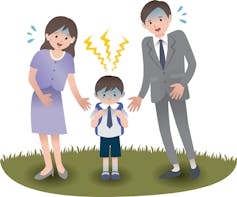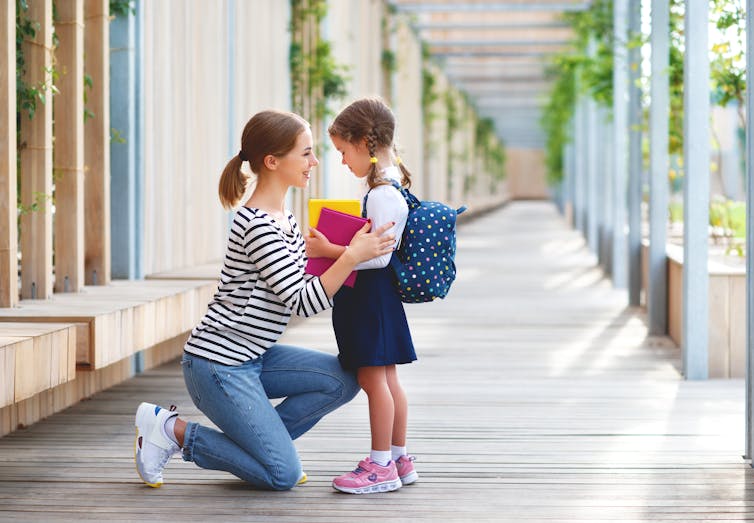Source: The Conversation (Au and NZ) – By Mandie Shean, Lecturer, School of Education, Edith Cowan University
Starting school is an important event for children and a positive experience can set the tone for the rest of their school experience.
Some children are excited to attend school for the first time, yet others feel anxious. Back to school anxiety is a widely accepted phenomenon, but there is no data on exactly how many children feel anxious prior to starting school.
The data available indicates 6.9% of 4-11 year olds (278,000 children) have a diagnosed anxiety disorder in Australia.
Children who experience anxiety are more likely to have worse academic outcomes if it is not addressed. Therefore, it is critical to manage feelings of anxiety effectively to ensure children experience success in school. Parents can be comforted by the fact research shows exposure to our fears helps to reduce anxiety.
Fear of the unknown
Children can feel anxious about starting school due to uncertainty and a perceived lack of control. In one study, children said they felt shy or scared when they were starting school because they were unsure of their teacher, what was going to happen and where they would put their things.Children also reported making friends and meeting “scary big kids” as a worry when they were starting school. However, some children were also excited about the possibility of making new friends.
Read more: From childcare to high school – what to do if you don’t like your kid’s friend
This shows if children perceived the experience as a threat rather than an opportunity, they experienced anxiety.

The stories we tell
When children have not attended school before they rely on their parents’ stories to help them frame their expectations. Research indicates children have increased social anxiety when parents’ stories include a threat in the environment or suggest the child is vulnerable.
Conversely, when parents’ stories include encouragement and suggest the child is competent and can cope, the children have less anxiety.
Related to that is research showing children can experience anxiety due to either excessive reassurance from their parents or overprotectiveness. While excessive reassurance is done to encourage children, it can also communicate to them there is a threat. It can cause children to become reliant on their parents for comfort when they are stressed and believe they are unable to cope alone.
Being overprotective can be due to parents’ own anxiety and insecurities about the school system. Unfortunately, while it is done in love, too much parent control leads to reduced problem solving skills and reduced competence in children. Overprotective parenting can communicate to children they need protecting from a “threat” (school). Children begin to feel anxious unless their parent is there to protect them.
Read more: Too much love: helicopter parents could be raising anxious, narcissistic children
Separation from parents can cause anxiety too. The diagnosis of separation anxiety is characterised by excessive anxiety concerning separation from the home or from those to whom the child is attached. Separation anxiety is normal in children but can be exacerbated by divorce, stress, or the child’s temperament.
What helps children feel less anxious about starting school?
There are several things that can help children — and their parents — feel less anxious about starting school.
Schools can communicate well with parents so they have knowledge about the upcoming processes. When parents know how things work they have reduced anxiety, therefore their child also has less anxiety. Schools can explain where children are dropped off, how long parents can stay, and how they arrange meetings with teachers. If you are a parent, ask for this information if it is not provided.

Parents and schools can provide children with skills and information. This can include positive advice on making friends, where things are located (such as the toilet), and how to access support. Some certainty and control can alleviate feelings of anxiety.
Research shows talking to children about future events and listening to their concerns can alleviate anxiety. This doesn’t mean you bring up potential threats, but address concerns on the children’s mind.
Read more: So your child refuses to go to school? Here’s how to respond
When parents make links between previous positive experiences and starting school, children are less anxious. Parents can remind children of the time they succeeded at swimming when they were nervous, or how they learned their alphabet. These small successes can provide a foundation for children’s school success.
Parents can also provide their child with some control and certainty over starting school. Let children select their bag and stationery. Walk around the school grounds with them. Introduce them to a child in the same year. Some certainty within uncertainty is healthy.
Finally, tell a good story. School can be exciting and filled with great experiences. Frame school as a potentially positive experience and one to look forward to. They may be nervous but they can overcome it.
– ref. Is your child anxious about starting school for the first time? Here’s how you can help – https://theconversation.com/is-your-child-anxious-about-starting-school-for-the-first-time-heres-how-you-can-help-153297




